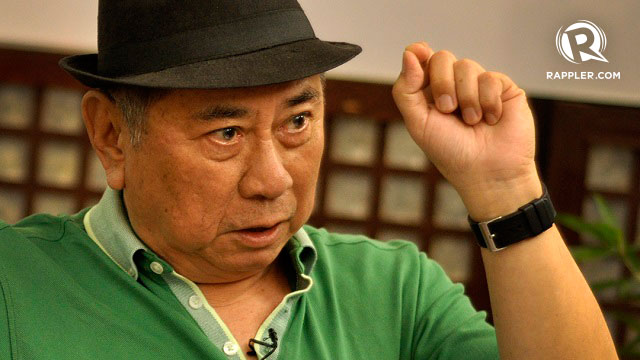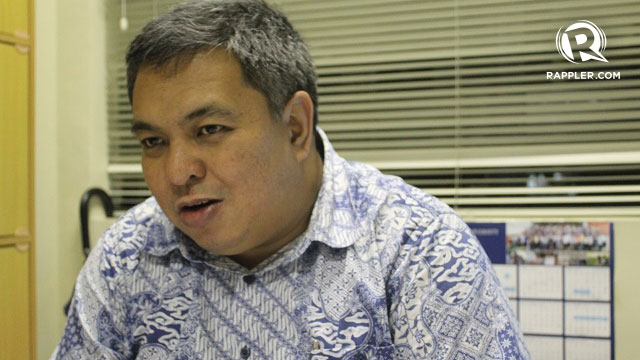SUMMARY
This is AI generated summarization, which may have errors. For context, always refer to the full article.

MANILA, Philippines – In 1973, protests and debates triggered the renaming of the national language’s name from “Pilipino” to “Filipino” in the Constitution.
Critics then argued that “Pilipino” was just another name for “Tagalog” (a politically sensitive name at that time, according to a study) and that the national language should not be developed this way.
The 1987 Consitution later included a provision saying that as “Filipino” evolves, “it shall be further developed and enriched on the basis of existing Philippine and other languages.”
Today, the Komisyon sa Wikang Filipino’s (KWF) resolution to change the name of our country from “Pilipinas” to “Filipinas” is also being met with protests and debates. This time, critics are saying that the move is impractical and indicates the commission’s colonial mentality.
The discussion on this issue has unfortunately drifted away from the development of the national language – the very essence of the resolution, KWF chair Virgilio Almario told Rappler in an interview.
Colonial mentality?
In a 1992 article titled “Patayin ang ‘Pilipinas’ (Kill ‘Pilipinas’),” Almario said the country should use “Filipinas,” the country’s original name from Spanish colonizers, who named their new colony after Spanish King Felipe II. He said heroes such as Marcelo H del Pilar, after all, used the name “Filipinas.”
It was this remark that irked many. A Manila Standard Today column even said the resolution smacks of colonial mentality.
Almario shrugs off the criticism.
“I think ang dapat mangyari, maunawaan nila na hindi pagbabalik ito sa colonial mentality, kundi ito ay pagsulong upang maipakita natin na totoong iginagalang natin ang integrity ng mga native language,” he said. (I think what must happen is an understanding that this is not a return to colonial mentality, but a promotion of true respect for the integrity of our native languages.)
Almario maintained that the letter “F,” while not widely-used in Tagalog, can be found in a multitude of languages from Batanes to Mindanao. He said this shows how inclusive the change would be.
“Nangangahulugan yung ‘F’ na yun, symbolically para sa amin, na partisipasyon ng mga katutubong wika ng ating bansa sa pagpapaunlad ng wikang Filipino.” (The meaning of that ‘F’, symbolically for us, is the participation of the native languages of our country in the development of the Filipino language.)
Besides, “colonial mentality” and “Virgilio Almario” do not go together, Michael Coroza said. A professor in Ateneo and a poet mentored by Almario himself, Coroza said those accusing the national artist of colonial mentality obviously have not read his works.
“Si Rio Alma, kolonyal? E numero uno ngang kritiko ng kolonyalismo yun e. Tingnan mo nga kung may bahid ng kolonyalismo sa kanyang mga pagsusulat. Kung susuyurin mo lahat ng kanyang aklat, lahat yun anti-kolonyal. Nag-iisip siya hindi bilang kolonyal kundi post-kolonyal, nag-iisip siya paano itataguyod ang sarili, ang pagkatao ng bansa, [at] ng bayan,” he says.
(Rio Alma? Colonial? He’s the number one critic of colonialism. See if his writing has any hint of colonialism. If you would look carefully at his books, all of them are anti-colonial. He thinks post-colonially, he ponders how to promote the identity of the self, the country, and the nation.)

No name-changing
Coroza pointed out that when stripped off the “politics and ad hominems,” the proposed change simply has to do with spelling.
But what’s in a spelling?
Coroza explained that contrary to popular belief, “Filipinas” had been around longer than “Pilipinas.” But people began using “Pilipinas” when, before the 1973 Constitution, the national language was still “Pilipino.”
The national language then had no letter ‘F’ in its alphabet.
“Imagine you declare this national language [which] has an alphabet, but its alphabet cannot spell the name of the country. So what do we do? Ah, we have to make that name follow the alphabet,” he said.
“But now that we have an ‘F’ in the alphabet, then don’t you think it’s all right to use the original name, the name that has been there which the old alphabet could not spell?”
Academic
Last August 5, Rep Magi Gunigundo delivered a privilege speech slamming the KWF’s resolution and even questioning the qualifications of its officials for changing a part of the implementing rules and regulations of the commission.
Almario replied in an open letter, saying they are not ordering a change in the name of the country, but encouraging the Filipinos’ use of “Filipinas” until, maybe, Gunigundo himself crafts a bill to officially change the translation of Philippines to “Filipinas.”
But Coroza, who himself only started using “Filipinas” in 2004, thinks it will take time to change what people have been used to.
“Hindi naman komo nakasanayan mo, yun na yung totoo e…‘Wag mong kukuning pamantayan sa buhay kung ano yung nakasanayan ay tama; yun ang pinakamaling patakaran sa buhay…May mas mabigat na batayan bukod sa nakasanayan, at ano yun? Ang mga pinatutunayan ng kasaysayan.”
(What you have been used to isn’t necessarily the truth…Do not use it as a standard for truth; that is the worst principle in life. There is a standard that weighs more, and what’s that? The one backed up by history.)
Both Almario and Coroza acknowledged that the campaign for “Filipinas” is – above all – an academic endeavour.
“Ano mang nakasanayan, ‘pag pinagpasyahang baguhin, ay mababago.” (You can decide to change whatever you have been used to.) – Rappler.com
Add a comment
How does this make you feel?
There are no comments yet. Add your comment to start the conversation.